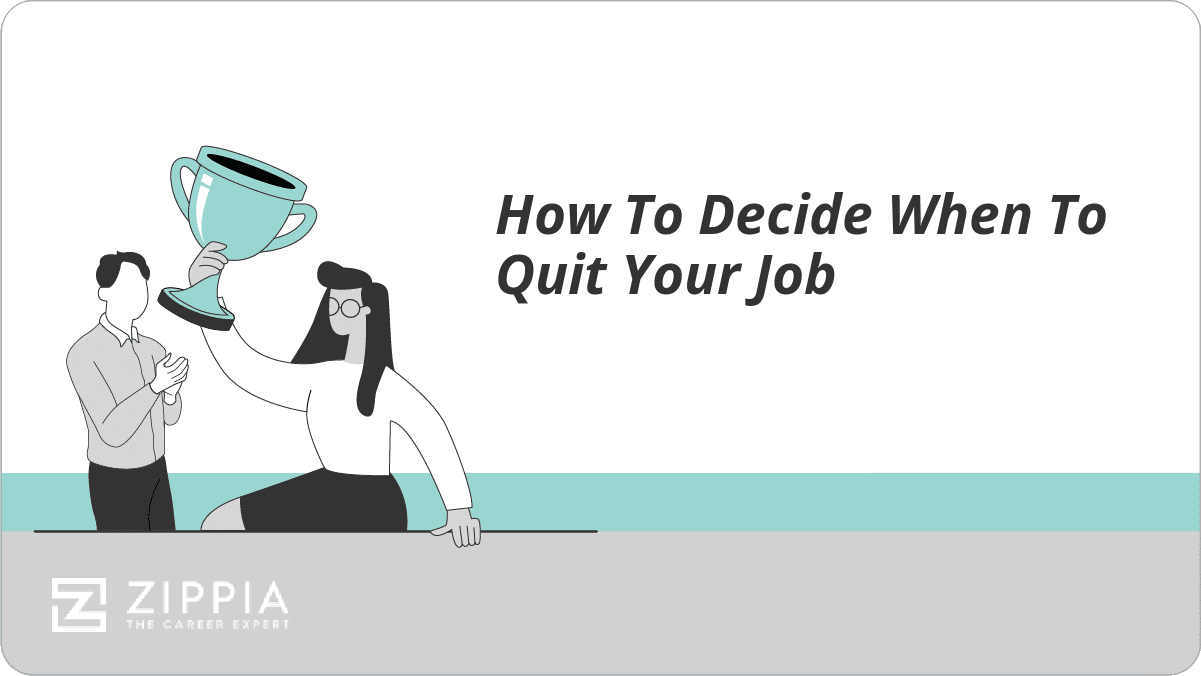- How To Quit
- The Process
- Leaving The Office
- Other Ways To Leave
- Paperwork
Find a Job You Really Want In
Quitting a job is no easy process, regardless of whether you’ve done it before.
That doesn’t mean it’s not worthwhile. Oftentimes, when you’re in a bad situation, quitting your job is the only option left to you.
The question of when to quit your job is a difficult one to answer.
So how do you tell when a job is bad enough that it’s worth quitting? And how do you quit a bad job without alienating everyone you ever worked with?
These are all tough questions, but fortunately, we’ve put together a guide to help you figure out the answers. We’ll cover the warning signs it’s time to quit your job, give tips to prepare for your exit, and walk you through the best way to quit once you’re ready.
Key Takeaways:
-
There can be many legitimate reasons for quitting your job. Some reasons include a lack of growth, constant misery, and compromised values.
-
Before you decide to quit, make sure to take appropriate steps. You want to talk to your boss about your issues, have other opportunities lined up, and make a solid plan.
-
When you quit, make sure not to burn any bridges at your job. You never know if you’ll need the help of a former boss or coworker in the future.

How Do You Know When It’s Time to Quit Your Job?
You’ll know it’s time to quit your job when the warning signs start to pile up.
There will come a point in most people’s careers at which a change of scenery isn’t just preferred — it’s necessary.
At times like these, the writing is usually on the wall, but even so, it’s not always easy to read.
Here are a few signs you might want to start thinking about leaving your current job:
-
You haven’t learned anything new in a long, long time. In order to stay competitive in the workplace, you should be continually staying up to date on your industry and learning new skills.
It’s normal to get good at your job at a certain point, but if your learning has started to totally stagnate, then it’s time to start looking around.
-
You’ve gone as far as you can in your current position. When there’s nowhere left for you to move at your current job but down, then — unless you’re comfortable where you are — you should start looking for something with more growth potential.
-
You’re miserable where you are. It’s one thing to not be totally in love with your job — it’s another thing if your job is causing you unhealthy levels of stress or is making you genuinely unhappy. Left unchecked, these feelings can impact your health and productivity in often extreme ways.
-
You procrastinate a lot. If you spend more time putting off work than actually doing it, it’s a huge red flag that you’re no longer an engaged employee. You can’t get excited about your work, and distractions always win out.
-
You’re overqualified. On the flip side, you might find your work completely unchallenging. Your skills far surpass the necessities of the job. Coupled with a lack of upward mobility, this is a sign that it’s time to quit your job.
-
You’re being recruited. If other companies are actively seeking you out for your unique talents, you might be better appreciated elsewhere than your current place of employment. It’s a huge confidence-booster and a great opportunity to learn what else is out there that might suit your skill set better.
-
You don’t fit in culturally. This could look different depending on your situation. Maybe your boss’s management style just doesn’t gel with yours, or your coworkers all seem like a big clique that you’re not a part of.
Or it could just be a rigid scheduling system that doesn’t allow for adequate work-life balance. Whatever the reason, you feel like the odd man out at work.
-
You have to deal with a toxic work environment. Whether it’s a difficult boss, a condescending coworker, or just a mountain of negative talk and grumbling, toxic work environments can drain you of your energy and enthusiasm.
Especially pessimistic situations like this can be great for prompting you to quit your job and seek out something more fulfilling.
-
You complain about work all the time. A healthy amount of kvetching about your job is perfectly normal.
But when every conversation you have with your friends and family revolves around how much you hate your job, that’s a sign to start examining what you actually want out of a job. Then, use that information to start your job search.
-
Your job is damaging your health. Stress and burnout are real, and they’re part and parcel of some jobs. When you don’t have the time or energy to devote to a nutritious diet, adequate exercise, and appropriate amounts of sleep because of your job, it’s time to start considering a new line of work.
-
Your values are compromised. Maybe you love your coworkers and you enjoy your work, but if your work or the company’s mission runs counter to your own values, it’s hard to feel good about what you do.
Whether the company’s products cause cancer or the founder has publicized his controversial social views, leaving a job because of your ethics will make you feel better in the long run.
-
You’re underpaid. Nothing fancy here; if you do some salary research and find your compensation significantly lacking (and management has denied raise requests or given only a pittance more), then it’s time to look for a place that will value your contributions more.
-
You’re not passionate about your work. Okay, so not every job is going to make you feel 100% fulfilled all the time. But when you can’t get excited about any aspect of your job or feel good about yourself after a job well done, it’s time to seriously examine those feelings.
-
You don’t respect your boss. The boss-employee relationship is one of the most important to your success and happiness at work. When you can’t see eye to eye with your boss about anything, it makes life hell.
You’ll feel like you’re fighting an uphill battle with every task and decision, and you’ll ultimately be drained by the process more than the work itself.
-
You’re underappreciated. If you never hear a “thank-you,” your input is disregarded or discouraged, and you’re singled out for public criticism, it’s time to get the hell out of there.
When should you not quit a job?
Now, just as there are plenty of valid reasons to quit your job, it is just as important to understand when not to quit your job.
Simply put, you shouldn’t quit your job impulsively when you don’t have a plan. If you do not have another job lined up, enough savings to live off of until you find a job, or some other means of financial support, then quitting your job will make your life very difficult.
Before you quit, ask yourself, “have I done all I can to make this job better?” Quitting your job is no small task, so don’t treat it lightly.
Try to learn more at your job. Talk to your boss and your peers about your issues. Write down why you want to quit your job, then put it away for a few weeks and come back to it to see how you feel.
Think your decision through. It might be that you have a valid reason to quit, like the ones found above, but even if that’s the case, you need to take the proper steps before you just up and go.
What to Do Before Handing in Your Two Weeks’ Notice
Leaving your current job without first preparing yourself for what comes after is a lot like jumping from a plane without a parachute.
Sure, you could potentially survive. The world is an uncertain place, and past events cannot predict future ones. Anything could happen.
But I mean, the parachute is right there. It only takes a little more time to put it on before you jump.
So before you hand in your two weeks’ notice, take a week or two and think — what can you do to help prepare yourself for life after you leave?
Here are a few examples of things you might want to do before you quit your job:
-
See if you can make a change. Some of the reasons for quitting are more resolvable than others. If there’s anything positive about working for your current employer, you might be able to have a conversation that ends with you in a position or situation that suits you better.
Your manager might be more willing than you think to make adjustments to keep you around.
-
Identify why you want to quit. Before you make any big decisions or start looking for a new job, take the time to reflect on the reasons for quitting listed above. That way, you’ll have a much better idea of what to look for and what questions to ask as you conduct your job search.
-
Get your references in order first. Almost any new job is going to require good references from you, one of which should be from the place where you currently work. That means getting a reference from someone you work with (boss or not) before moving forward with resignation plans.
-
Find a new job first.This section is worthy of its own article, as it’s certainly no walk in the garden. But it’s tough to find a job when you’re unemployed, and tougher still the longer that unemployment lasts. If you have the time and ability to find a job before leaving your current one, you’ll be much better off in the long run.
-
Make a plan, and stick to it. However you’re thinking of resigning, you need to make a plan and draft a resignation letter. And make sure that you put your resignation plan in your calendar — otherwise, you’ll keep putting it off until it’s too late.
How To Quit Your Job Without Burning Bridges
So you’ve done all your prep work — you’ve got a new job lined up, maybe even with better pay than you had before — and everything seems like it’s coming up Milhouse.
It can be tempting at this point to want to use the moment of quitting your job as a big mic drop, where you finally tell your boss all the things you’ve always wanted to.
All the little indignities you suffered, all the nights worked with no overtime, all the times you were ever embarrassed or made to feel small — it’s easy to feel like now is the last time you’ll have to tell them how you really feel.
This would be a huge mistake. Tempting as it can be, this is just not the way to go.
Like it or not, you don’t know where your life is going to be, and more specifically, you don’t know whose recommendation is going to make or break you getting further jobs down the line.
With that in mind, here are a few tips for leaving your job without burning all the bridges you built before now:
-
Talk to your boss. It won’t be easy or comfortable, but your first step in quitting is having a professional chat with your boss. You may want your resignation letter prepared beforehand, or you might opt to have the conversation first and see how it goes. In any case, the conversation should come before the letter.
-
Hand in a resignation letter. Before you hand it in, you want to make sure there’s nothing insulting to your current employer in there. Remember, at the very least, you want your recommendation from them to be neutral, if not outright positive.
-
Make sure to give a two weeks’ notice. It’s a professional courtesy that you may not want to extend to a bad employer, but it’s expected of you if you want them to give you a good review. If your company is in the middle of a big project, you might be expected to see that project through to the end before you take your leave.
-
Tell your coworkers, but not before telling your boss. Even if you’re totally heartless, you never know what connections will be important down the line. Either way, your coworkers deserve to hear you’re leaving from you directly rather than having to learn about it secondhand.
-
Leave without further ado. Don’t spend any longer than you need to, or work an undue amount before you go. Your employer deserves a certain amount of work from you before you quit, but don’t let them take advantage of you.
Final Thoughts
That’s all for this one! Just keep in mind: Above all, when quitting your job, you should try to act appreciative — even if you’re not.
Quitting a job is a sticky social situation, but more than anything else it’s an exercise in humility. Regardless of your relationship with the people you worked with or for, you need them to think well of you.
So say thanks to anyone at the company who might have helped get you where you are today.
Then get the hell out of there.
- How To Quit
- The Process
- Leaving The Office
- Other Ways To Leave
- Paperwork





